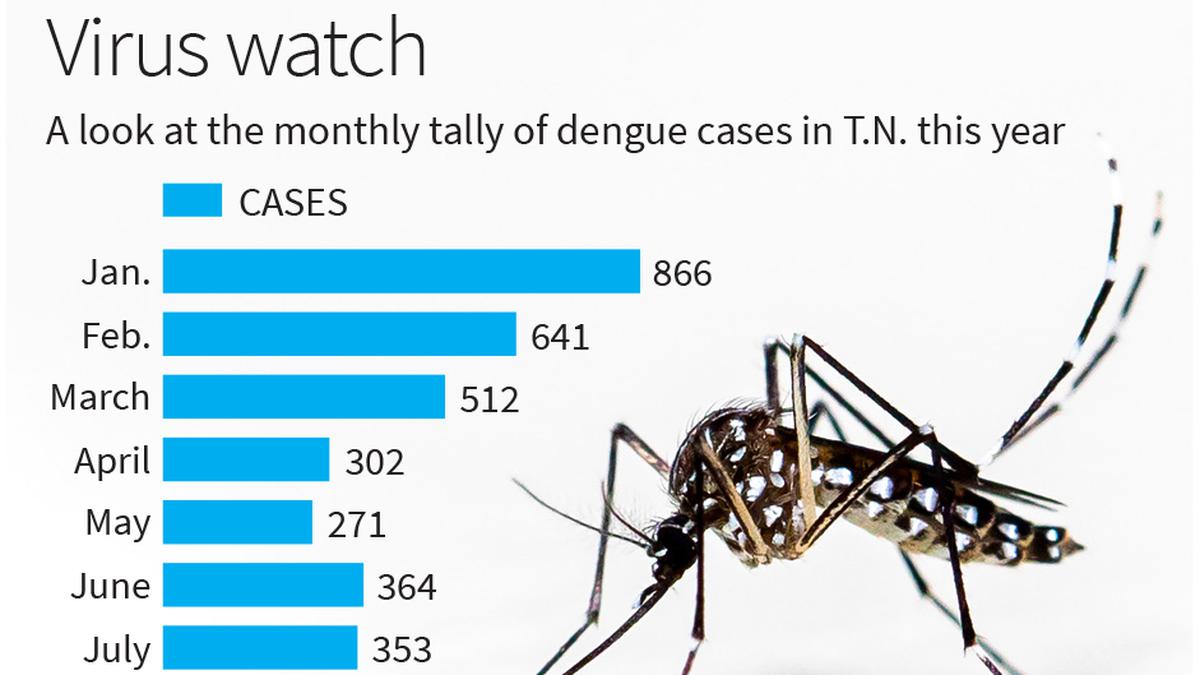
4,048 dengue cases reported in the past eight-and-a-half months in Tamil Nadu
The Hindu
TN reports 4,048 dengue cases in 8.5 months; Health Dept. steps up fever surveillance, prevention & control measures. Jan. highest with 866 cases, followed by Feb. (641). Cases rose to 535 in Aug. & 204 in Sept. Hotspots incl. Tenkasi, Tirunelveli, Kanniyakumari, Dindigul, Coimbatore & Chennai. Public Health Dept. focuses on fever surveillance & capacity building for healthcare workers. RGGGH readies dengue ward. Warning signs incl. persistent vomiting, intense abdominal pain, reduced urine output & delirium. Public & govt. must act together.
Tamil Nadu has reported a total of 4,048 cases of dengue in eight-and-a-half months this year. With cases marginally rising, the Health Department is stepping up fever surveillance, prevention and control measures, and insisting on prompt diagnosis and treatment.
According to data from the Directorate of Public Health (DPH) and Preventive Medicine, January accounted for the highest number of cases so far, at 866, followed by February (641). After a steady fall in the monthly figures, cases gradually began rising again. The number of cases rose to 535 in August, while 204 cases were reported so far in September. In a span of seven days – September 7 to 13 – the State reported a total of 113 dengue cases.
“So far, the number of dengue cases is on expected lines. Usually, we expect a rise in cases during September, October, November and December. There is a marginal rise, for which we need to intervene,” T.S. Selvavinayagam, Director of Public Health, said.
Some districts, particularly those in the Western Ghats, are pockets of concern. “Districts such as Tenkasi, Tirunelveli, Kanniyakumari, Dindigul, Coimbatore and Chennai are hotspots. This is based on previous experience,” he said.
According to details available on the website of the National Centre for Vector Borne Disease Control, Tamil Nadu reported a total of 6,430 cases of dengue and eight deaths in 2022.
At the field level, the Public Health Department was focusing on fever surveillance to identify cases as quickly as possible. “We need to go to the area of origin and check for other cases. Picking up cases early will prevent further spread and mortality. Prompt diagnosis and treatment are crucial,” Dr. Selvavinayagam said.
With fluid management being crucial, he said capacity building for healthcare workers was another focus area. People should seek medical care at the earliest, he said.

‘Instead of accusing Gen-Z of lacking skills or discipline, we need to ask what drives them’ Premium
At a recent event held in the city, Cambridge University Press & Assessment launched an advisory panel comprising leaders from top global corporations, aiming to bridge the employability gap in India and better align academic output with industry needs. A whitepaper released at the event highlighted the growing importance of communication skills, the need for stronger collaboration between industry and universities, and strategies to bridge the persistent skill gap.

Under the NBS, newborns are screened for communication disorders before they are discharged from the hospital. For this, AIISH has collaborated with several hospitals to conduct screening which is performed to detect hearing impairment and other developmental disabilities that can affect speech and language development. The screening has been helping in early intervention for those identified with the disorders, as any delay in the identification poses risk and affects successful management of children with hearing loss, according to AIISH.











